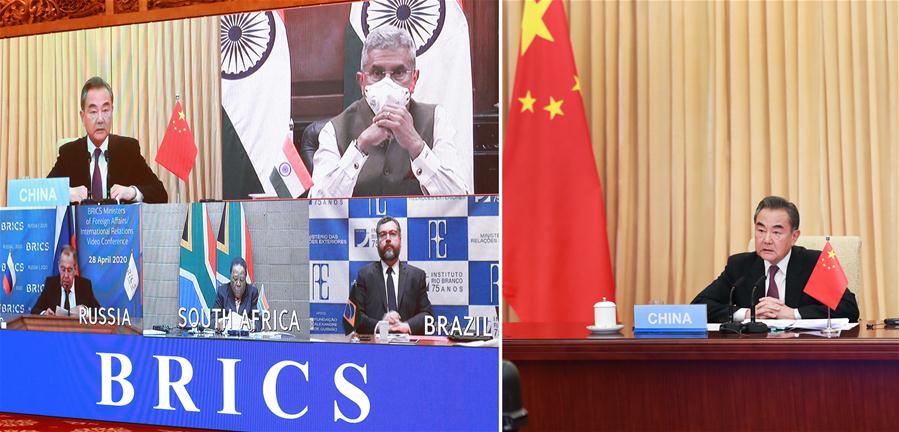BRICS countries agree to boost cooperation on COVID-19 fight
The consensus was reached during the BRICS Foreign Ministers' Extraordinary Conference on COVID-19 via video link.
BRICS countries Tuesday evening agreed to enhance collaboration in fighting against the COVID-19 pandemic.

Combo photo shows Chinese State Councilor and Foreign Minister Wang Yi attending the BRICS Foreign Ministers' Extraordinary Conference on COVID-19 via video link in Beijing, capital of China, April 28, 2020. [Photo/Xinhua]
The consensus was reached during the BRICS Foreign Ministers' Extraordinary Conference on COVID-19 via video link, which was chaired by Russian Foreign Minister Sergei Lavrov and gathered Chinese Foreign Minister Wang Yi, Brazilian Foreign Minister Ernesto Araujo, Indian External Affairs Minister S. Jaishankar and South Africa's Minister of International Relations and Cooperation Naledi Pandor.
Wang, who is also a state councilor, called on BRICS countries to "make the right call and do the right thing," as COVID-19 has put lives and health of people around the world under grave threat.
"We need to champion multilateralism and the approach of consultation and cooperation for shared benefits in governance," Wang said.
He encouraged countries to enhance coordination on macro economic policies and sustain coordination to keep up secure and smooth functioning of global industrial and supply chains.
Going forward, China is ready to step up the sharing of information and experience with BRICS countries and conduct joint research and development of drugs and vaccines on the basis of respecting each other's sovereignty and national conditions, said Wang.
The BRICS countries, including Brazil, Russia, India, China and South Africa, must support UN bodies in playing their due roles in fighting COVID-19, he stressed.
He also voiced China's support in Russia's chairmanship and its initiative to formulate a Strategy for BRICS Economic Partnership 2025.
During the meeting, the foreign ministers had an in-depth exchange of views on safeguarding multilateralism, fighting against COVID-19, and advancing BRICS cooperation. They agreed to intensify information and experience sharing, push ahead collaboration in research of drugs and vaccines, contribute to global public health security, and minimize negative effects of the pandemic.

